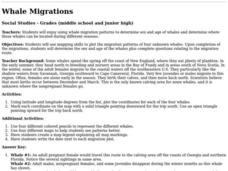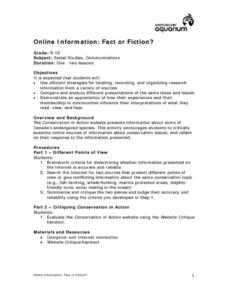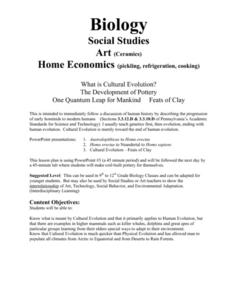SeaWorld
Animal Migrations
Here is a fabulous set of activities for your young scientists. Each lesson contains map, hands-on, and game activities that will help the class understand why and how animals migrate from one place to another. First they'll examine the...
Film Space
Whale Rider
Ready for an educational movie day? Use a resource based on the movie Whale Rider to learn more about the Maori culture. Class members answer a variety of questions and listen to music from the soundtrack to further analyze and...
Curated OER
Whose Point of View? The Journey of Three Generations
A reading of Whale Journey, a fact-filled picture book by Vivian French, launches a study of the life cycle and migration of three generations of gray whales. The interdisciplinary lesson plan offers opportunities extensions into all...
Curated OER
A Whale of a Difference
Students research various perspectives on Japan's commercial whaling industry and formulate position papers representing these views. They read the Times article, Yuk! No More Stomach for Whales. Groups present their perspectives on...
Curated OER
Whale in the Sky
Students gain a greater understanding of Native Americans and why they build totem poles. They listen to a story and then create a similar story of their own.
Curated OER
Ocean Exploration
Students explore whales. In this animal adaptation and whale instructional activity, students access prior knowledge about whales from previous lessons, then use background knowledge to predict the eating strategies of a baleen whale and...
Curated OER
Whaling Slide Show
Tenth graders research a database on whaling. They search for photos that represent the whaling industry. In the classroom they use a projector and give a five-minute presentation.
Curated OER
A Quick Look at the Makah Whaling Issue
Students discuss the idea of values and how they are different for different people and cultures. Using the Internet, they read about the Makah whaling issue affecting the Pacific Northwest. They discuss who has the right and authority...
New Bedford Whaling Museum
A New Bedford Voyage!
A thorough set of activities, articles, and reference material can enlighten your class about the history of whaling in New England. Kids travel back to a time when whale products were valuable and hunting whales was a way to help the...
Curated OER
Whale Migrations
Learners use whale migration patterns to determine sex and age of whales and determine where these whales can be located during different seasons. They use mapping skills to plot the migration patterns of four unknown whales.
Curated OER
A Natural Connection to the Azores
Students use primary sources to examine whaling voyages, biology, and geography. In this geography lesson, students analyze ship logs and plot locations of animals and determine routes using latitude and longitude.
Curated OER
How Do Values Shape Conflicts?
Pupils work through conflict. In this conflict resolution lesson, students participate in a simulation that requires them to consider both sides of the whaling issue.
Kate Stickley
Reading the World: Latitude and Longitude Lesson latitude and longitude, maps, coordinates on a map, prime meridian, reading maps, equator, globes
Find five activities all about longitude and latitude! Use oranges to show the equator and prime meridian, plot birthdays on a map using coordinates, and plan a dream vacation.
Curated OER
Inuit and Arctic Animals
Young scholars will explore the animals and people living in the Arctic. In this science lesson, students locate Alaska on a globe, discuss its climate and geographical features, and identify common arctic animals. Young scholars...
Curated OER
Online Information: Fact or Fiction
Discuss ways to determine if the information middle and high schoolers gather online is accurate. Using the Internet, they cite two sources that show conflicting points of view on a subtopic of conservation. They summarize and analyze...
University of the Desert
What Is Extremism?
By participating in discussions using prompts and statements provided in the lesson plan, learners identify the concept of extremism and consider what causes violent acts of extremism in the modern world.
Curated OER
The Greatest Threats
High schoolers work together in groups to research one way killer whales are being threatened. They brainstorm ways to some the threat and actions that can be taken to keep them protected. In new groups, they share their proposed...
Curated OER
What Is A Community?
Students engage in a lesson which introduces the definition of a community and challenges them to explore the characteristics of their own community. This lesson uses the true story of Humphrey the Lost Whale as an illustration of how...
Curated OER
The History of Money
For this social studies worksheet, students investigate the history of paper money and coins. Students read paragraphs about what early people used for money and what kinds of banks were used. Students complete a crossword puzzle.
Curated OER
American Indians Heritage Series: The Tlingit's
Students study the Native American culture of the Tlingits and discuss relevant information regarding their way of life. Students create their own musical Tlingit rattles using toilet paper rolls and rice. They make and decorate their...
Curated OER
Why Do Governments Exist? Locke, Hobbes, Montesquieu, and Rousseau
Here is a great secondary source reading that includes the primary ideas and philosophies of the famed Enlightenment philosophers: Thomas Hobbes, John Locke, Charles Montesquieu, and Jean-Jacques Rousseau. In additional to discussing...
Curated OER
Research Project
Young scholars learn the importance of National Marine Sanctuaries and create an original illustrated research project.
Curated OER
Arctic Animals
In this word search puzzle worksheet students find 16 words. All pertain to animal life in the Arctic region. There is a word bank for this whale shaped puzzle.
Curated OER
What is Cultural Evolution?
Students comprehend what is meant by Cultural Evolution and that it primarily applies at Human Evolution, but that there are examples in higher mammals such as a killer whales, dolphins and great apes of particular groups by exploring...























